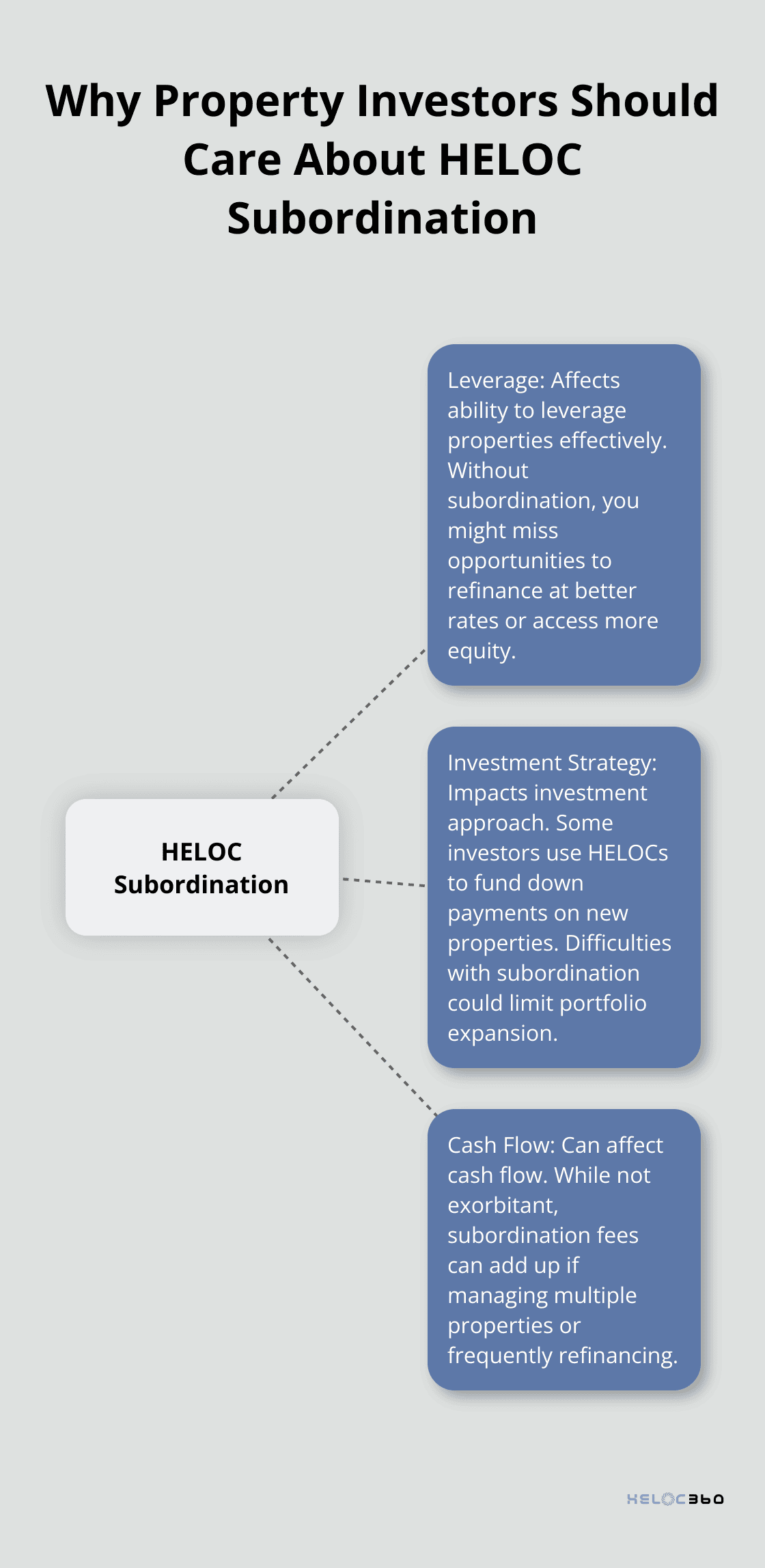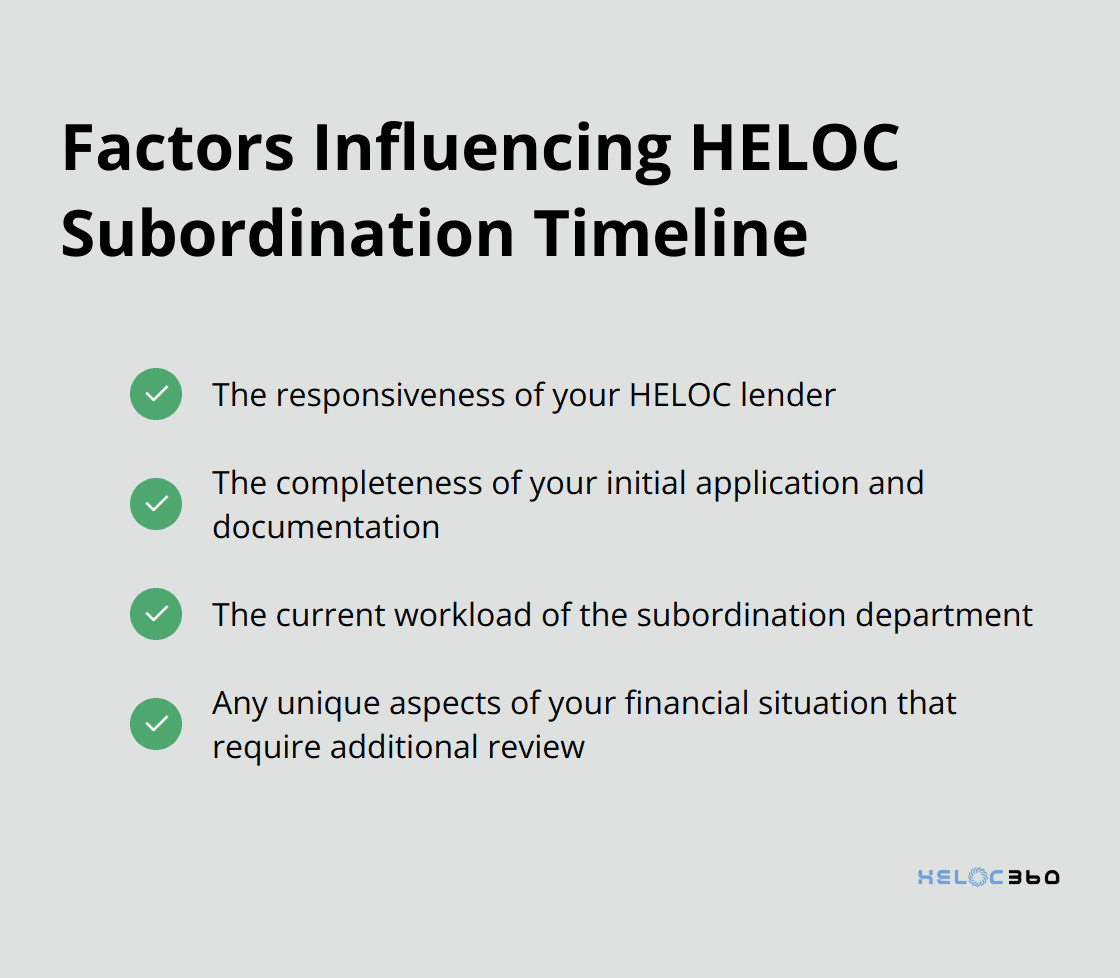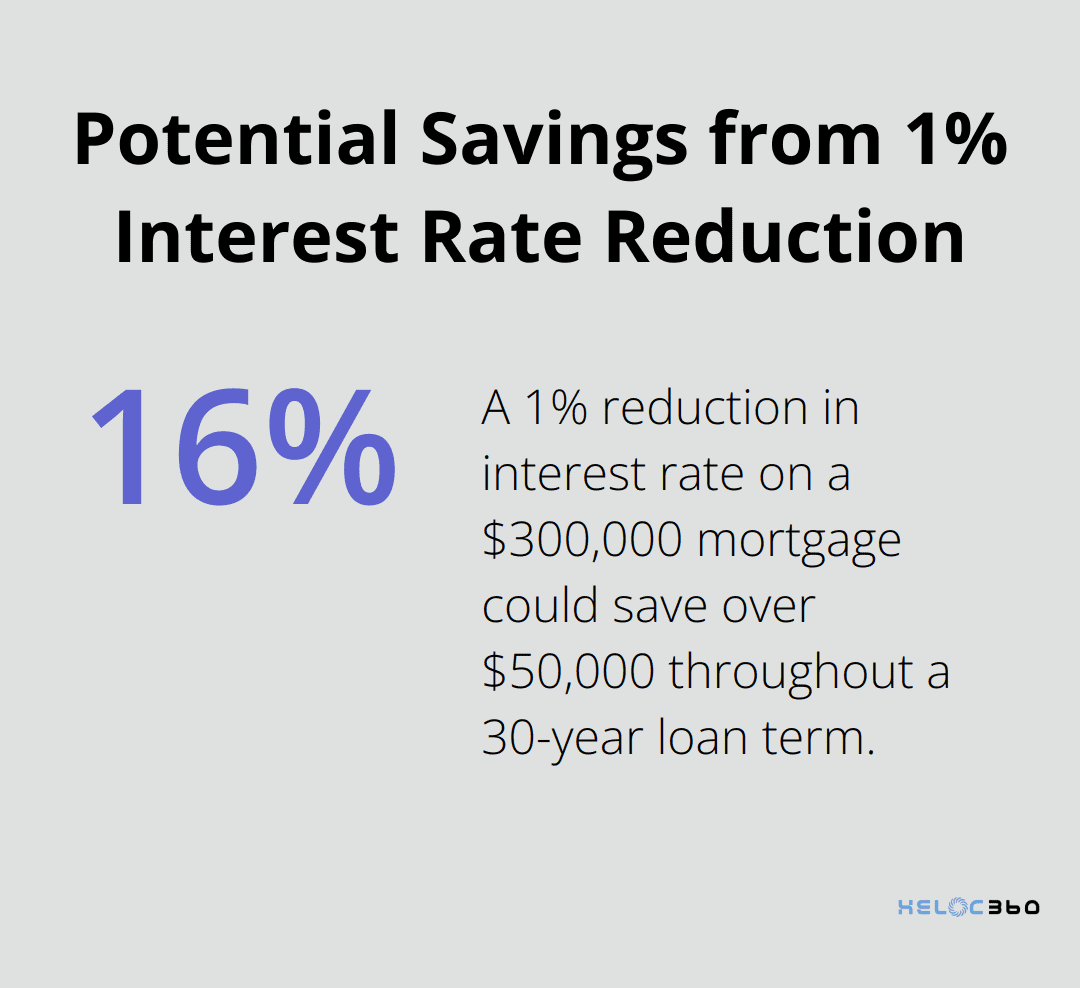HELOC subordination is a crucial concept for property investors looking to maximize their financing options. At HELOC360, we often field questions about this complex process and its implications.
This blog post will break down HELOC subordination, explaining its importance, the steps involved, and how it can impact your investment strategy.
What is HELOC Subordination?
The Essence of HELOC Subordination
HELOC subordination is a financial process that property investors must understand to make informed decisions about their real estate investments. At its core, subordination changes the priority of liens on a property. When you have multiple loans secured by your property (such as a primary mortgage and a Home Equity Line of Credit), these loans rank in order of priority. The first mortgage typically holds the senior position, while the HELOC takes a subordinate role.
The Mechanics of Lien Position
In real estate finance, lien position determines who receives payment first if the property sells or faces foreclosure. When you apply for a HELOC, the lender usually accepts a second position behind your existing mortgage. However, situations arise where this order needs to change, and that’s where subordination comes into play.
For instance, if you refinance your primary mortgage, your new lender will want to ensure they’re in first position. This requires the HELOC lender to agree to subordinate their lien, essentially moving back into second place.
The Importance for Property Investors
Property investors should care about HELOC subordination for several reasons:

- Leverage: It affects your ability to leverage your properties effectively. If you can’t subordinate a HELOC, you might miss opportunities to refinance at better rates or access more equity.
- Investment Strategy: Subordination can impact your investment approach. Some investors use HELOCs to fund down payments on new properties. If subordination becomes difficult or impossible, it could limit your ability to expand your portfolio.
- Cash Flow: Subordination can affect your cash flow. These fees, while not exorbitant, can add up if you manage multiple properties or frequently refinance.
Navigating the Subordination Landscape
As a property investor, you need to take a proactive approach to subordination. Before taking out a HELOC, ask the lender about their subordination policies. Some lenders offer more flexibility than others.
Also, consider the timing of your investments and financing moves. If you plan to refinance soon, it might be wise to wait on opening a HELOC until after the refinance completes. This can save you the hassle and expense of going through the subordination process.
HELOC subordination isn’t just a technicality-it’s a tool that savvy property investors can use to their advantage. Understanding the process and planning accordingly will help you maintain flexibility in your financing options and keep your investment strategy on track. Now, let’s explore the specific steps involved in the HELOC subordination process and what you can expect along the way.
Navigating the HELOC Subordination Process
Initiating the Subordination Request
The HELOC subordination process starts when you apply for a refinance on your primary mortgage. Your new lender will require the HELOC to be subordinated to maintain their first-lien position. You must contact your HELOC lender to request subordination. Many HELOC lenders have specific departments that handle these requests.
Lenders often require a formal subordination request form. This form typically asks for details about your current HELOC, the proposed refinance, and your personal financial information. Some lenders charge a fee for this service.
Gathering Necessary Documentation
After you initiate the request, you must provide a set of documents to your HELOC lender. These typically include:
- A copy of your new mortgage application
- The preliminary title report
- A current appraisal of your property
- The proposed new loan terms
- Your most recent financial statements
The exact requirements vary between lenders, so ask for a comprehensive list upfront. Having these documents ready can significantly speed up the process.
The Review and Approval Phase
Your HELOC lender will review the information after you submit your request and documentation. They want to ensure that the new loan terms don’t significantly increase their risk. This review process can take anywhere from a few days to several weeks, depending on the lender and the complexity of your situation.
If your HELOC lender approves the subordination, they will issue a subordination agreement. This legal document formally acknowledges that your HELOC will take a second-lien position behind your new primary mortgage.
Timeline Considerations
The entire subordination process typically takes between 2 to 4 weeks. However, some cases complete in as little as 10 business days, while others stretch beyond a month.
Several factors can influence the timeline:

- The responsiveness of your HELOC lender
- The completeness of your initial application and documentation
- The current workload of the subordination department
- Any unique aspects of your financial situation that require additional review
To keep things moving, stay proactive. Follow up regularly with your HELOC lender and promptly provide any additional information they request. Delays in the subordination process can potentially hold up your entire refinance.
Streamlining the Process
To make the HELOC subordination process smoother and less stressful, try these strategies:
- Prepare all necessary documents in advance
- Communicate clearly and frequently with both your refinance lender and HELOC lender
- Set reminders to follow up on your request regularly
- Consider working with a mortgage professional who has experience with subordination
Understanding these steps and being prepared can significantly improve your experience with HELOC subordination. As we move forward, let’s explore the advantages and potential drawbacks of this process for property investors.
Weighing the Impact of HELOC Subordination
Financial Flexibility Unleashed
HELOC subordination offers property investors significant financial flexibility. When you agree to subordinate your HELOC, you create an opportunity to refinance your primary mortgage. This can lead to substantial savings if interest rates have decreased since your original financing. For instance, a 1% reduction in interest rate on a $300,000 mortgage could save you over $50,000 throughout a 30-year loan term.

Subordination also allows you to keep your existing HELOC while refinancing. This means you maintain your line of credit for future investments or emergencies without reapplying or paying additional closing costs. For investors managing multiple properties, this liquidity proves invaluable when unexpected opportunities or expenses arise.
Potential Roadblocks and Challenges
Despite its benefits, HELOC subordination presents certain challenges. One significant hurdle is the additional time it adds to your refinancing process. It’s important to note that the specific timeline for HELOC subordination can vary, and lenders may need to determine applicability of certain regulations.
The risk of denial also exists. HELOC lenders aren’t required to subordinate their position. If your financial situation has worsened or if the new loan terms significantly increase the lender’s risk, they might refuse. The specific denial rate for HELOC subordination requests can vary based on numerous factors, including property values and loan-to-value ratios.
Credit Implications and Borrowing Power
HELOC subordination itself doesn’t directly impact your credit score. However, the refinancing process that often accompanies subordination can affect your credit. Each new loan application (including refinances) results in a hard inquiry on your credit report. While a single inquiry typically only reduces your score by a few points, multiple inquiries in a short period can have a more significant impact.
On the positive side, successfully refinancing to a lower interest rate can improve your debt-to-income ratio, potentially boosting your borrowing capacity for future investments. Credit scores can change over time due to various factors, including payment history and credit utilization.
Navigating the Decision-Making Process
As a property investor, you must carefully consider these factors when contemplating HELOC subordination. The process involves weighing the potential benefits against the risks and challenges. It’s advisable to consult with financial professionals or reach out to specialized platforms (such as HELOC360) for personalized guidance. These experts can help you analyze your specific situation and make an informed decision that aligns with your long-term investment strategy and financial goals.
Timing and Market Considerations
The timing of your HELOC subordination can significantly impact its effectiveness. Pay attention to market trends and interest rate forecasts. If rates are expected to rise, acting quickly on subordination and refinancing could lock in lower rates for your primary mortgage. Conversely, if property values in your area are declining, it might be prudent to wait, as decreased property value could lead to subordination denial.
Final Thoughts
HELOC subordination empowers property investors with financial flexibility and strategic refinancing opportunities. The process demands careful planning and consideration of potential benefits and challenges. Market conditions and timing significantly influence the success of HELOC subordination, so investors must stay informed about interest rate trends and property value fluctuations.
Professional guidance proves invaluable when navigating the complexities of HELOC subordination. Expert advice helps investors understand the implications for their investment strategy and make informed decisions aligned with their financial goals. Seeking professional assistance can streamline the subordination process and provide clarity on its potential impact.
HELOC360 specializes in helping property investors unlock the full potential of their home equity. Our platform offers tailored solutions and expert guidance to support your investment journey (whether you’re considering HELOC subordination or exploring other ways to leverage your home’s value). HELOC360 provides the knowledge and connections needed to make confident financial decisions and fuel your property investment goals.
Our advise is based on experience in the mortgage industry and we are dedicated to helping you achieve your goal of owning a home. We may receive compensation from partner banks when you view mortgage rates listed on our website.
